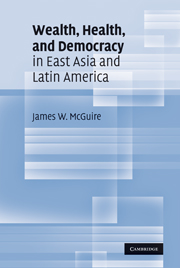Book contents
- Frontmatter
- Contents
- Figures and Tables
- Preface and Acknowledgments
- Abbreviations
- 1 Incomes, Capabilities, and Mortality Decline
- 2 Democracy, Spending, Services, and Survival
- 3 Costa Rica: A Healthy Democracy
- 4 Chile: The Pinochet Paradox
- 5 Argentina: Big Welfare State, Slow Infant Mortality Decline
- 6 Brazil: From Laggard to Leader in Basic Health Service Provision
- 7 Taiwan: From Poor but Healthy to Wealthy and Healthy
- 8 South Korea: Small Welfare State, Fast Infant Mortality Decline
- 9 Thailand: Democratization Speeds Infant Mortality Decline
- 10 Indonesia: Authoritarianism Slows Infant Mortality Decline
- 11 Wealth, Health, Democracy, and Mortality
- Appendix Tables
- Works Cited
- Index
11 - Wealth, Health, Democracy, and Mortality
Published online by Cambridge University Press: 06 July 2010
- Frontmatter
- Contents
- Figures and Tables
- Preface and Acknowledgments
- Abbreviations
- 1 Incomes, Capabilities, and Mortality Decline
- 2 Democracy, Spending, Services, and Survival
- 3 Costa Rica: A Healthy Democracy
- 4 Chile: The Pinochet Paradox
- 5 Argentina: Big Welfare State, Slow Infant Mortality Decline
- 6 Brazil: From Laggard to Leader in Basic Health Service Provision
- 7 Taiwan: From Poor but Healthy to Wealthy and Healthy
- 8 South Korea: Small Welfare State, Fast Infant Mortality Decline
- 9 Thailand: Democratization Speeds Infant Mortality Decline
- 10 Indonesia: Authoritarianism Slows Infant Mortality Decline
- 11 Wealth, Health, Democracy, and Mortality
- Appendix Tables
- Works Cited
- Index
Summary
In the eight cases just reviewed, as well as in the quantitative analysis reported in Chapter 2, democracy, especially long-term democratic experience, generally did promote the public provision and expanded utilization of basic health care, education, family planning, water, and sanitation services, in more diverse ways than is often recognized. These social services, in turn, were associated with lower infant mortality, even after economic, demographic, geographic, and cultural circumstances were taken into account. Democracy, then, can be vindicated on the basis of its beneficial consequences for policies that promote the expansion of important human capabilities, as well as defended both on the basis of its intrinsic importance and by virtue of the role it plays in encouraging discussion and debate in which wants and needs originate.
In particular, democracy encouraged large-scale primary health care programs. Even in cases where authoritarian governments implemented such programs, as occurred in Chile under Pinochet, the expectations that encouraged the programs, the expertise and infrastructure on which the programs drew, and the propensity of poor people to use the services provided by the programs was influenced by many decades of previous democratic or semidemocratic experience. The success of many such programs at accelerating infant mortality decline, even in the context of unfavorable economic circumstances, suggests that improving economic output- and income-related indicators is not the only way for a society to reduce the risk of early death.
- Type
- Chapter
- Information
- Wealth, Health, and Democracy in East Asia and Latin America , pp. 278 - 310Publisher: Cambridge University PressPrint publication year: 2010



